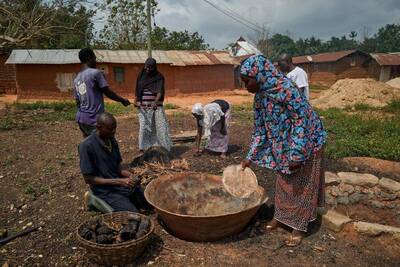Barry Callebaut's sustainable cocoa roadmap

Chocolate manufacturer Barry Callebaut has committed to a set of sustainable initiatives that aim to reduce the carbon footprint and improve the biodiversity of its cocoa farms.
Originating from the Amazon basin, much of world’s cocoa comes from small, sun-drenched farms in West Africa.
Climate change, poor soil, overuse of fertilisers and pesticides, and a lack of natural inputs, such as shade and pollinators, are adding more pressure on cocoa farmers who are already experiencing declining cocoa yields.
As part of its Forever Chocolate plan to make sustainable chocolate the norm, Barry Callebaut has committed to be carbon and forest positive by 2025.
By reducing its carbon footprint and achieving a deforestation free supply chain, the company hopes to help preserve ecosystems and increase the long-term productivity of cocoa in environmentally suitable areas.
“Our commitment to biodiversity is focused on both on-farm and off-farm activities, including soil regeneration and the creation of carbon sinks, agroforestry and the regeneration of natural ecosystems,” the company said in a statement.
Biochar for carbon sinks and regenerative soil fertility
Known as “agriculture’s black gold” and made from agricultural waste, such as weeds, leaves and cocoa pods, biochar can be used as a natural fertiliser to improve soil quality. Importantly, biochar can enhance living soils and create carbon sinks. Simply put, while trees can temporarily remove carbon from the atmosphere, biochar applied to soil can capture carbon and store it for hundreds of years, thus creating a permanent carbon storage.
Over the past two years, Barry Callebaut has conducted research in Ghana, Germany, the UK and Indonesia to test which biochar formulation works most effectively on cocoa and other native tree species found in cocoa growing areas.
“In the last few months, we have received exciting confirmation that our biochar has positively affected both the root size and growth of the cocoa tree. This means planting new seedlings with biochar can greatly increase the survival rate of those trees,” the company said.
“As a result, cocoa plants will be healthier and more resistant to heat, drought and disease, reducing the need for agro-chemicals. Going forward, our plan in 2022 is to use biochar at large scale for planting both cocoa and non-cocoa trees.”
Trees for protection and habitat creation
The company has also increased its output towards creating a diverse ecosystem by planting specific types of trees that provide shade for cocoa seedlings.
By cultivating biodiverse cocoa farms, the company hopes to attract pollinators, such as birds, bees and other insects, that will help reduce pests and diseases and, critically, the need for pesticides and fungicides.
“To unlock this powerful natural potential, we are scaling up the capacity of our nursery production facilities in Côte d’Ivoire, Ghana, Cameroon, Brazil, Ecuador and Indonesia,” the company said.
“Our nurseries are stocked with both cocoa and non-cocoa seedlings. For example, in Côte d’Ivoire we are distributing close to one million seedlings in 2021, with species including cocoa, teak, mahogany, sugar palm, coconut and mandarin.”
Restoring high-value ecosystems
Restoration of degraded forests and ecosystem corridors between farms aims to bring back the ecosphere of a forest, such as water and soil quality and native plant species. In May 2021, the Swiss manufacturer commenced the planting of 300 hectares of degraded forest in Côte d’Ivoire.
“As part of this project, we are planting around 35 species to help restore the original state of the existing environment. Through this activity, we are also creating employment opportunities for local communities,” the company said.
“We intend to scale this activity and focus on the restoration of classified forests and other areas to ensure sustainability and the achievement of our Forever Chocolate commitments.”
Turning sustainability into an advantage in food and beverage
Nearly half of all Australian shoppers are influenced by sustainability when making purchases,...
The 'flour effect' pathway to Scope 3 emission cuts
An Australian Study reveals how a simple ingredient could become a climate solution for food...
Whey to go up: unlocking further potential for cheese by-product
A new mixed-method study explored four models that could provide potential for the Australian...













